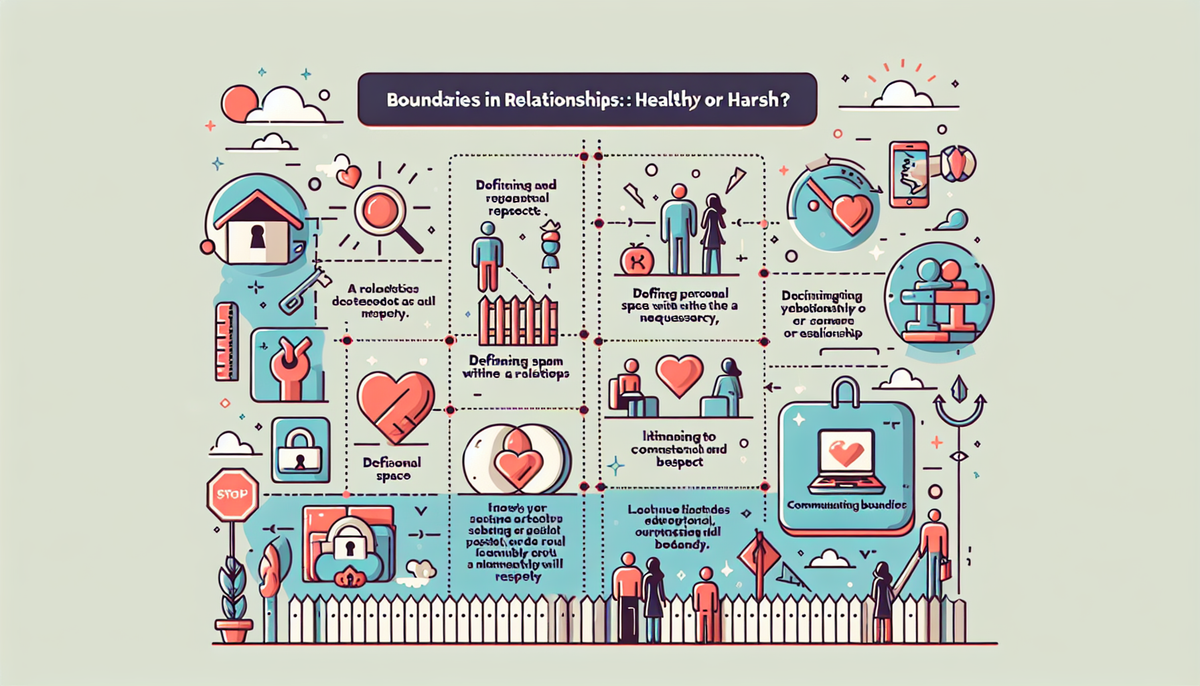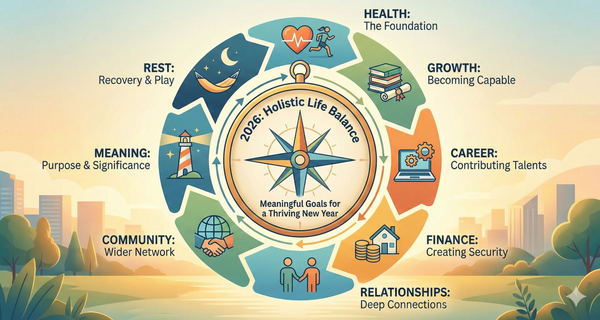Boundaries in Relationships: Healthy or Harsh?

Boundaries in Relationships: Healthy or Harsh?
The conversation around relationship boundaries often brings up conflicting images. For some, boundaries are the harsh walls that keep partners at a distance. For others, they are the very foundation of a healthy, respectful partnership. So, which is it? Are these 'love rules' a sign of a controlling relationship or the secret to deep and lasting intimacy? The truth is, relationship boundaries are not just healthy; they are essential. They are the invisible lines we draw that teach others how to treat us, protect our self-respect, and ultimately, create a space where true love can flourish without sacrificing our sense of self. This article will explore why boundaries are the ultimate act of self-love and respect within a relationship.
What Exactly Are Relationship Boundaries?
At its core, a relationship boundary is a limit you set for yourself to protect your well-being. It’s a guideline that communicates your needs, values, and limits to your partner. Far from being a set of restrictive rules imposed on the other person, boundaries are about what you will or will not accept. They are a declaration of your self-worth and a critical component of a balanced and healthy relationship.
Defining Your Personal Space as a Couple
Many people fear that setting boundaries will create an emotional chasm between them and their partner. However, the opposite is true. Healthy relationship boundaries are not about pushing your partner away; they are about defining your personal space so that you can come together in a more meaningful way. This means having the freedom to have your own hobbies, friendships, and time alone without guilt. It's about understanding that a healthy relationship consists of two whole individuals, not two halves making a whole.
Why 'Love Rules' Are a Sign of Respect, Not Restriction
The term 'rules' can sound rigid, but when it comes to relationships, agreed-upon 'love rules' are actually a powerful sign of mutual respect. These are not about controlling a partner's behavior but about agreeing on how you will treat each other. For example, a 'love rule' might be to not raise your voice during disagreements or to always discuss major financial decisions together. These are not restrictions; they are expressions of love and respect that protect the integrity of the relationship.
Boundaries as the Cornerstone of Self-Respect in Love
Without boundaries, self-respect can easily erode in a relationship. When you consistently allow your limits to be crossed, you send a message to your partner and to yourself that your needs are not important. Setting and maintaining boundaries is the ultimate act of self-respect, and it sets the tone for how your partner will treat you.
How Boundaries Nurture Your Individual Identity
It's beautiful to share your life with someone, but it's dangerous to lose yourself in them. Relationship boundaries are crucial for nurturing your individual identity. They ensure that you continue to grow as a person, to pursue your own goals, and to maintain your own values. This individuality is what keeps the relationship vibrant and prevents the codependency that can lead to resentment and dissatisfaction.
The Direct Link Between Healthy Boundaries and a Balanced Partnership
A partnership without boundaries is often an unbalanced one. One partner's needs, desires, and opinions may consistently overshadow the other's, leading to a dynamic of control and submission. Healthy relationship boundaries ensure that there is a balance of power and that both partners have an equal voice. This balance is fundamental to creating a partnership built on mutual respect and true equality.
Key Types of Boundaries to Nurture in Your Relationship
Boundaries come in many forms, and a healthy relationship will have a variety of them in place. Understanding the different types of boundaries can help you identify where you may need to establish or strengthen your own 'love rules'.
Emotional and Mental Boundaries
Emotional boundaries are about respecting each other's feelings and emotional space. This means you are not responsible for your partner's happiness, nor are they for yours. It’s about being supportive without taking on their emotional baggage as your own. Mental boundaries involve respecting each other's thoughts and opinions, even when you disagree. It means engaging in healthy debate without belittling or dismissing your partner's perspective.
Physical and Sexual Boundaries
Physical boundaries relate to your personal space and your comfort with touch. It could be as simple as needing some quiet time after work without being immediately embraced. Sexual boundaries are about clear and enthusiastic consent. This involves open communication about your desires, limits, and comfort levels, ensuring that your sexual relationship is mutually satisfying and respectful.
Financial and Time-Related Boundaries
Financial boundaries are practical 'love rules' about how you manage money as a couple. This might involve having separate or joint accounts, agreeing on a budget, or discussing large purchases beforehand. Time-related boundaries are about how you spend your time, both together and apart. It's about respecting each other's schedules and making a conscious effort to prioritize quality time together while also allowing for individual pursuits.
How to Communicate Your Boundaries with Love and Clarity
Setting boundaries is one thing; communicating them is another. The key is to be clear, firm, and loving. Remember, you are not attacking your partner; you are expressing your needs to preserve the health of the relationship.
Using 'I' Statements: A Game-Changer in Communication
How you word your boundaries can make all the difference. Instead of saying, "You never give me any space," try an 'I' statement like, "I feel overwhelmed when I don't have some quiet time after work, and I need about 30 minutes to decompress." 'I' statements focus on your feelings and needs without placing blame, which is crucial for fostering healthy dialogue about relationship boundaries.
Navigating the Conversation When Boundaries Are Crossed
Even with the best intentions, boundaries can sometimes be crossed. When this happens, it's important to address it calmly and directly. Don't let it fester. You can say something like, "I know you didn't mean to, but I felt uncomfortable when you made that joke at my expense. It's important to me that we speak respectfully to each other." The goal is not to punish but to reinforce your 'love rules' with grace and firmness.
Conclusion: The Healthy Heart of a Relationship
So, are boundaries in relationships healthy or harsh? The answer is clear: they are the healthy, beating heart of a respectful and loving partnership. Setting relationship boundaries is not about creating distance; it's about creating a safe and sacred space where both partners can be their authentic selves. They are the 'love rules' that allow for intimacy to deepen, for self-respect to flourish, and for a relationship to thrive on a foundation of mutual understanding. Take some time today to reflect on your own boundaries. Are they clear? Are they respected? Communicating them might just be the most loving thing you can do for yourself and your relationship.




